
Best B2B Marketing Attribution Software in 2026
Traditional marketing attribution methods often struggle to track the many steps a buyer takes before becoming a customer. That’s where B2B marketing attribution software makes a difference. It helps you clearly see which marketing activities drive results, using data instead of guesswork. This guide will show you how to use attribution software effectively, share best practices, and help you turn your marketing strategy into a powerful, data-driven system.
With complex buyer journeys and many marketing channels at your disposal, measuring the true impact of your campaigns can feel like navigating a maze blindfolded. B2B sales cycles are notoriously long, involving multiple decision-makers and touchpoints. Attributing success solely to the last click or lead form paints only part of the picture. This lack of clarity leads to a familiar frustration: wasted marketing budgets, misallocated resources, and difficulty demonstrating your efforts’ true ROI.
This is where B2B marketing attribution software steps in as your data-driven hero. These powerful tools are a guiding light, shedding clarity on your marketing performance. By collecting data across all your marketing channels, B2B attribution software assigns credit to each touchpoint a prospect encounters throughout their journey. This empowers you to:
- Optimize Campaigns with Precision:
- Map Your Customer Journey:
- Measure ROI Accurately:
- Make Data-Driven Decisions:
Allocate your budget strategically based on which channels deliver the most value.
Understand how prospects interact with your brand at each stage.
Finally, track your marketing efforts’ true return on investment, proving their effectiveness to stakeholders.
Gain actionable insights to shape your B2B marketing strategy for maximum growth.
This blog post will be your comprehensive guide to B2B marketing attribution software. We’ll delve into the intricacies of these tools, exploring their features and benefits clearly and concisely.
Key Takeaways
- B2B marketing attribution software empowers businesses to strategically allocate budgets by identifying high-performing channels and optimizing campaign effectiveness.
- Understand how prospects engage with your brand across multiple touchpoints, from initial awareness to final conversion, to refine marketing strategies effectively.
- Gain clarity on the true return on investment from your marketing efforts, enabling you to justify budgets and demonstrate marketing’s impact on revenue generation.
- Utilize actionable insights from multi-touch attribution models to make informed decisions, enhancing overall marketing strategy and driving sustainable growth.
- By identifying and prioritizing effective marketing channels, businesses can allocate resources more efficiently and maximize the impact of their marketing spend.
Understanding B2B Marketing Attribution
Differences Between B2B and B2C Marketing Attribution
While both B2B and B2C marketing aim to drive sales and conversions, each attribution process is different from the other due to the distinct nature of their customer journeys and decision-making processes.
- Sales Cycle Length:
- Decision-Making Process:
- Customer Relationships:
- Channel Complexity:
Compared to B2C, B2B sales cycles are generally longer and involve more touchpoints. In B2B, decisions often require multiple consultations, product demonstrations, and stakeholder approvals. This extended timeline necessitates more complex attribution models that can account for numerous interactions over an extended period.
B2B purchases typically involve multiple decision-makers, such as procurement officers, managers, and executives. Each of these stakeholders interacts with different marketing materials, necessitating a multi-touch attribution model to understand the influence of each touchpoint.
B2B relationships are usually more personalized and involve ongoing interactions. Effective attribution in B2B must track these long-term engagements to measure marketing impact accurately.
B2B marketing often spans various channels, including webinars, whitepapers, trade shows, and direct sales outreach. Attribution models must integrate data from all these sources to provide a comprehensive view.
Common Challenges in B2B Marketing Attribution
Implementing effective marketing attribution in B2B environments comes with its own set of challenges:
- Data Integration:
- Tracking Multiple Touchpoints:
- Attribution Model Selection:
- Resource Allocation:
B2B marketers often need help integrating data from various platforms, such as CRM systems, marketing automation tools, and third-party data sources.
With extended sales cycles and numerous decision-makers, tracking all touchpoints becomes complex. Ensuring that each interaction is accurately recorded and attributed is a significant challenge.
Choosing the right attribution model (e.g., first-touch, last-touch, multi-touch) is critical but difficult. Each model has pros and cons, and the choice depends on the specific business context and goals.
Smaller marketing teams may need more resources and expertise to implement sophisticated attribution models, which can limit their ability to gain deep insights into marketing performance.
Key Benefits of Effective Attribution in B2B Marketing
- Enhanced ROI Measurement:
- Informed Decision-Making:
- Improved Customer Journey Understanding:
- Better Resource Allocation:
- Increased Sales and Marketing Alignment:
By accurately tracking which marketing efforts drive conversions, businesses can allocate resources more effectively, maximizing return on investment.
Detailed attribution insights enable marketers to make data-driven decisions, optimizing campaigns and strategies based on what truly works.
Multi-touch attribution provides a holistic view of the customer journey, highlighting which touchpoints are most influential and identifying areas for improvement.
Understanding the effectiveness of different channels and tactics helps businesses allocate budgets more efficiently, focusing on high-impact activities.
Attribution data fosters better collaboration between sales and marketing teams by providing a shared understanding of which activities drive results.
Top B2B Marketing Attribution Software
Selecting the right marketing attribution software is crucial for gaining insights into your marketing performance and optimizing your strategies. Below is a detailed overview of some leading B2B marketing attribution software options and their key features and benefits.
DiGGrowth
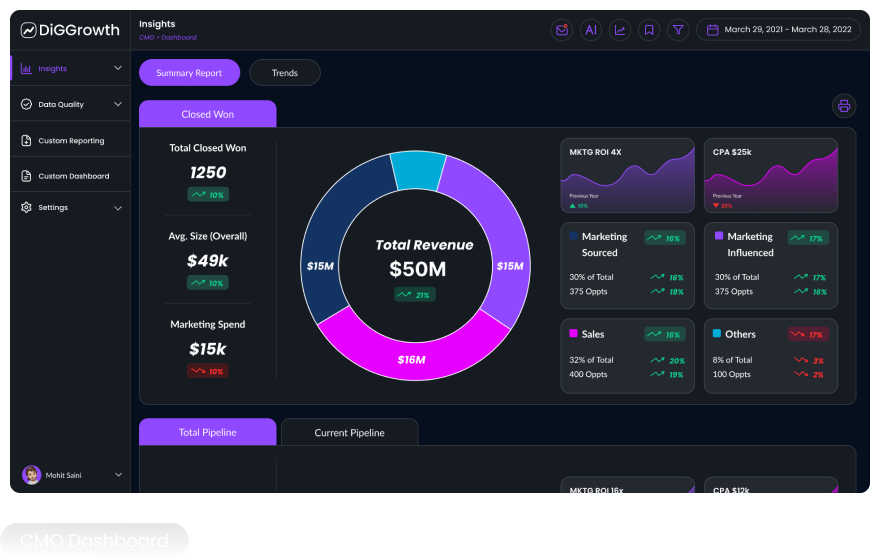
DiGGrowth offers a comprehensive marketing analytics and attribution platform designed to help marketing leaders and their teams become revenue-focused by accurately attributing revenue and pipeline to all marketing expenditures.
Key Features and Benefits
- Accurate Revenue Attribution:
- Customer Journey Tracking:
- Out-of-the-Box Reporting:
- Phygital Insights: Provides end-to-end user journey visualizations, blending online and offline marketing strategies for a unified customer experience.
- Targeted Solutions:
- Data Integration:
DiGGrowth’s precise attribution features help quantify the impact of marketing activities on revenue, ensuring the justified use of marketing dollars.
The platform stitches customer data to provide a holistic view of interactions, channel preferences, and paths leading to revenue.
Offers ready-to-use reports and machine learning-driven attribution models to support data-driven decision-making.
Tailored dashboards and reports for marketing leaders, operations managers, and performance marketers to measure effectiveness and streamline processes.
This process centralizes marketing data from various sources, including ad platforms, CRMs, website analytics, and marketing automation tools.
HubSpot
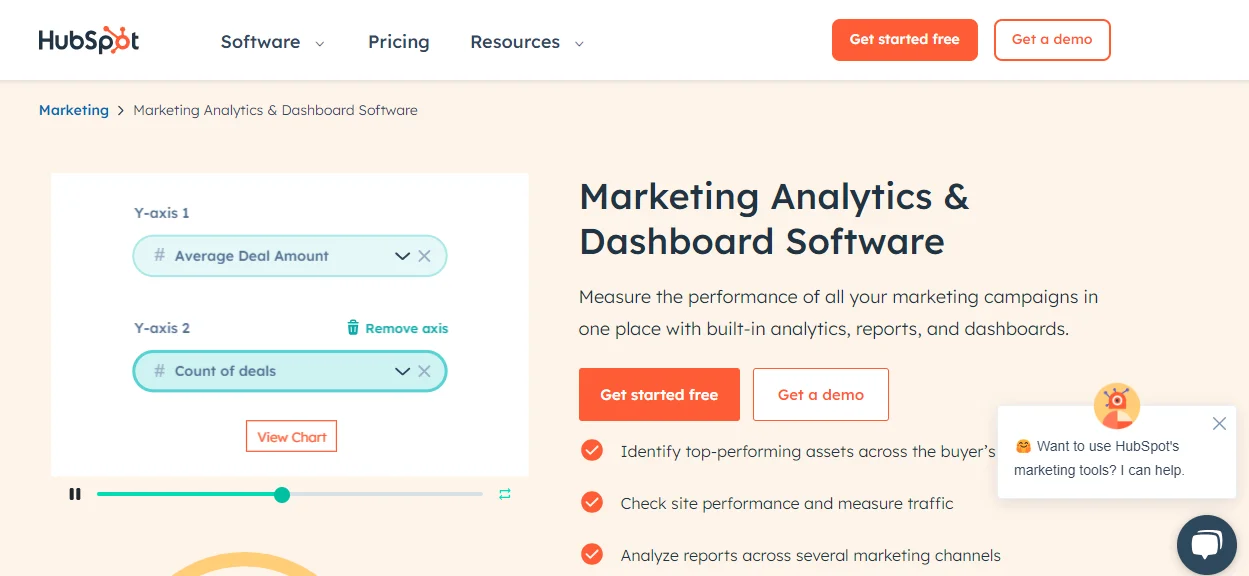
HubSpot is a comprehensive inbound marketing, sales, and service platform with robust attribution capabilities.
Key Features and Benefits
- Multi-Touch Attribution:
- Integration with CRM:
- Advanced Analytics and Reporting:
- User-Friendly Interface:
- Marketing Automation:
HubSpot offers customizable multi-touch attribution models, allowing businesses to understand the impact of each touchpoint on the customer journey.
Seamlessly integrates with HubSpot CRM, providing a unified view of customer interactions and marketing efforts.
This service provides detailed analytics and reporting tools, enabling marketers to track performance and make data-driven decisions.
Known for its intuitive and user-friendly interface, making it accessible for marketing teams of all sizes.
Includes powerful marketing automation tools, enhancing the ability to nurture leads and drive conversions.
Bizible
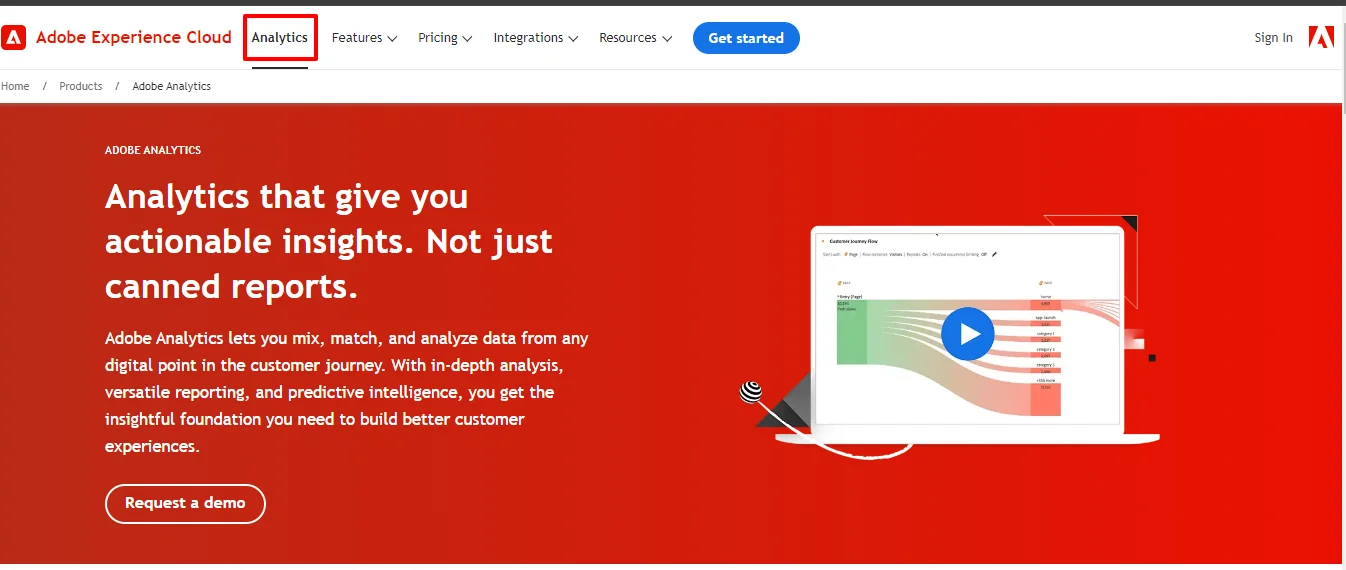
Bizible, now part of Adobe Experience Cloud, specializes in B2B marketing attribution. It focuses on connecting marketing performance to revenue and provides deep insights into the effectiveness of marketing campaigns.
Key Features and Benefits
- Full-Funnel Attribution:
- CRM Integration:
- Customizable Models:
- Revenue Attribution:
- Detailed Reporting:
This service offers comprehensive full-funnel attribution, from the first touch to the closed sale, ensuring every interaction is accounted for.
CRM integrates with major CRM systems, like Salesforce, providing a seamless data flow between marketing and sales.
Allows businesses to customize attribution models to fit their needs and goals.
Focuses on linking marketing efforts directly to revenue, helping marketers understand the ROI of their campaigns.
Provides in-depth reporting and analytics, enabling marketers to optimize their strategies based on real-time data.
Marketo
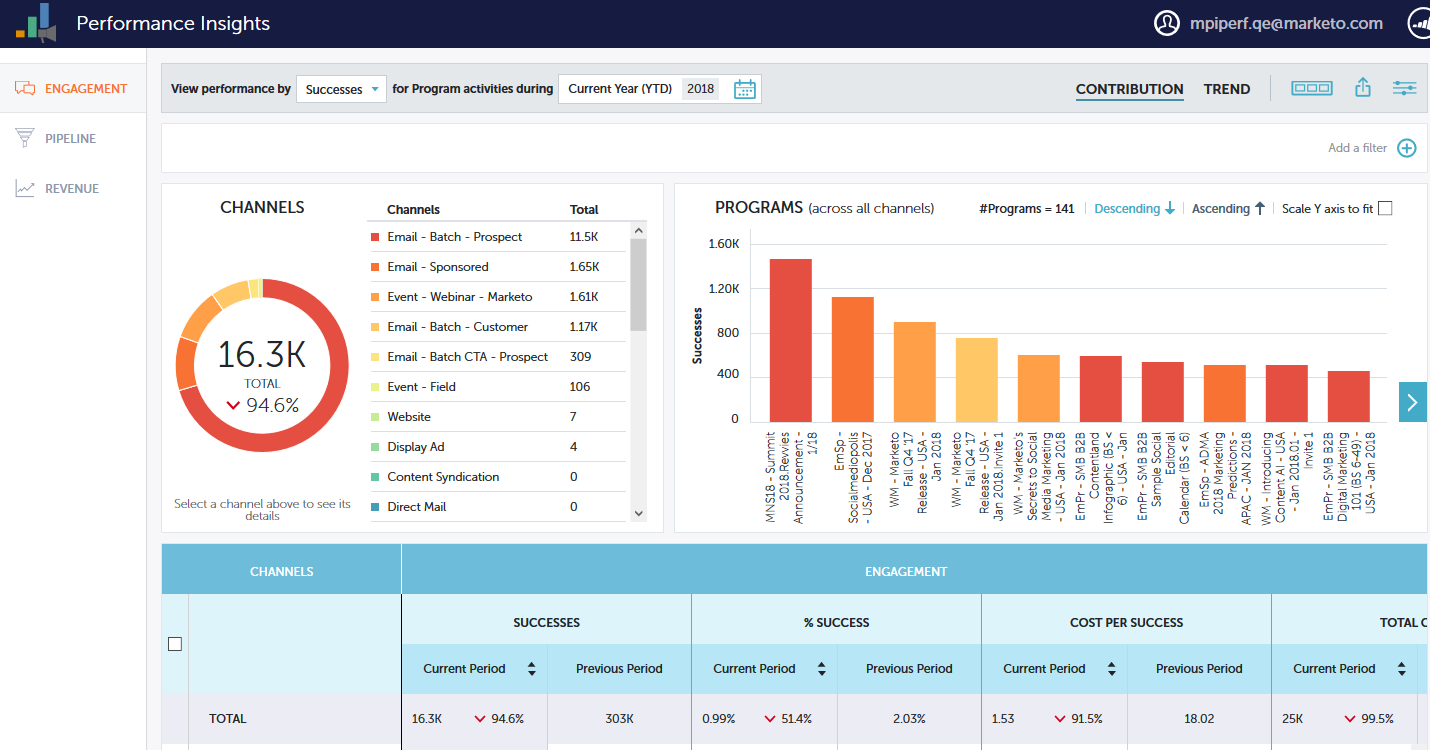
Marketo, part of Adobe Experience Cloud, is a leading marketing automation platform that offers advanced attribution capabilities. It’s designed to help businesses engage customers and drive growth.
Key Features and Benefits
- Multi-Touch Attribution:
- Behavior Tracking:
- Integration with CRM and Analytics Tools:
- Marketing Automation:
- Advanced Reporting:
Supports multi-touch attribution models, providing insights into the customer journey.
Tracks user behavior across multiple channels, offering a detailed view of customer interactions.
Easily integrates with CRM systems like Salesforce and analytics tools, ensuring data consistency.
Includes robust marketing automation features, helping businesses nurture leads and drive conversions.
Offers advanced reporting and analytics, enabling marketers to measure and optimize campaign performance.
Ruler Analytics
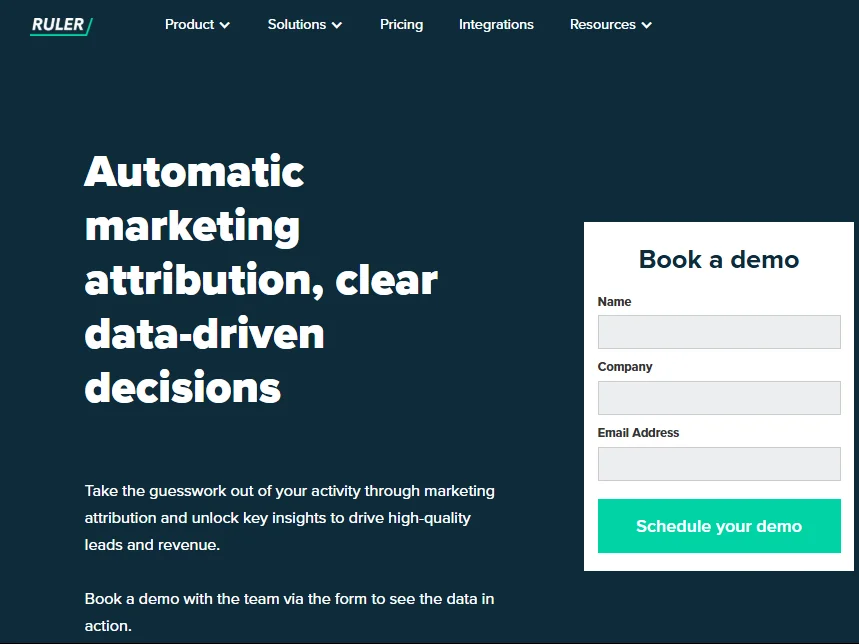
Ruler Analytics is a marketing attribution platform that connects marketing activity with sales revenue. It helps businesses track customer journeys and understand which channels drive the most value.
Key Features and Benefits
- Multi-Touch Attribution:
- Call Tracking:
- CRM Integration:
- Revenue Attribution:
- Real-Time Data:
Provides multi-touch attribution models, giving a complete view of the customer journey.
Includes call tracking features, allowing businesses to attribute phone calls to specific marketing efforts.
Integrates with major CRM systems, ensuring a seamless data flow between marketing and sales.
Links marketing efforts directly to revenue, helping businesses understand the ROI of their campaigns.
Offers real-time data and analytics, enabling quick and informed decision-making.
Terminus
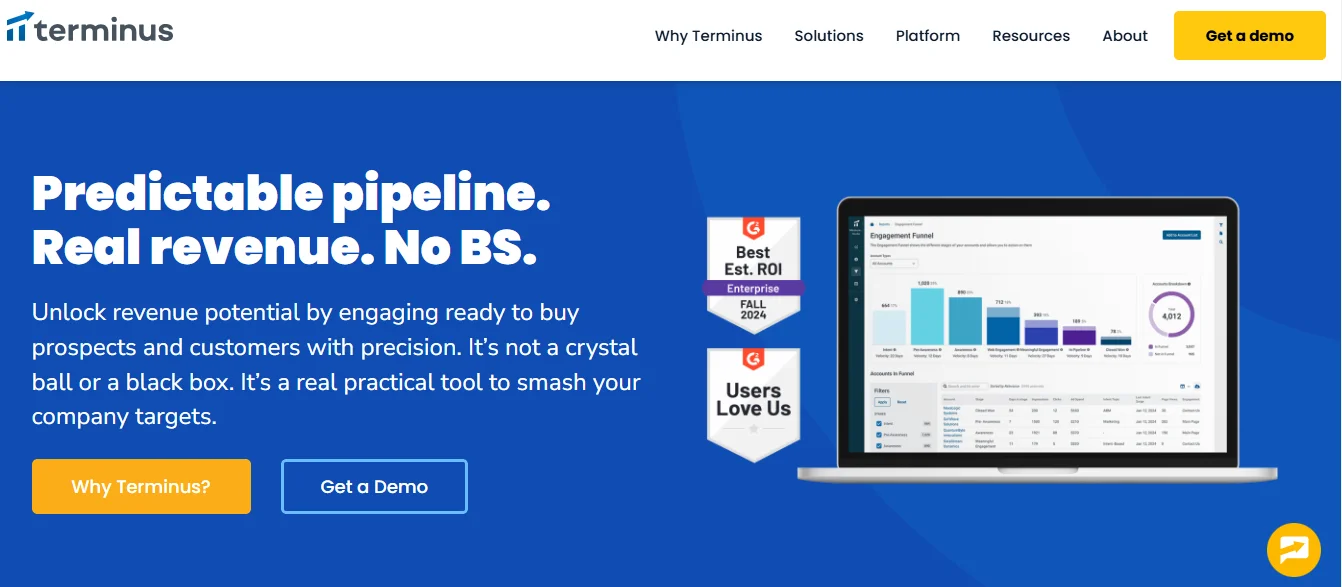
Terminus is an account-based marketing (ABM) platform with powerful attribution capabilities. It’s designed to help B2B businesses target and engage the right accounts.
Key Features and Benefits
- Account-Based Attribution:
- Multi-Channel Engagement:
- CRM Integration:
- Advanced Analytics:
- Personalization:
Focuses on account-based attribution, providing insights into the effectiveness of ABM campaigns.
Tracks engagement across multiple channels, including email, web, and events.
Seamlessly integrates with CRM systems like Salesforce, ensuring data consistency and accuracy.
Offers advanced analytics and reporting, helping businesses measure and optimize their ABM strategies.
Includes personalization features, enabling marketers to deliver tailored experiences to target accounts.
Choosing the Right B2B Marketing Attribution Software
Selecting the ideal B2B marketing attribution software can significantly impact your business’s ability to understand and optimize marketing efforts. Here are key factors to consider:
- Integration Capabilities:
- Customization and Flexibility:
- Real-Time Reporting and Insights:
- Scalability and Performance:
- Attribution Models and Methodologies:
- Cost and ROI:
- Customer Support and Training:
- Security and Compliance:
Ensure the software integrates seamlessly with your existing tech stack, including CRM systems like Salesforce or HubSpot, marketing automation platforms, and advertising channels like Google Ads and LinkedIn. This ensures comprehensive data collection and a unified view of your marketing performance.
Look for software to customize attribution models for your unique business needs. Flexibility in defining touchpoints, assigning credit, and adjusting attribution rules enables more accurate insights tailored to your specific marketing strategies.
Timely access to data is crucial for agile decision-making. Choose a platform that provides real-time reporting capabilities and actionable insights, allowing you to adjust campaigns promptly based on performance metrics.
Consider the software’s scalability as your business grows. It can handle increasing data volumes and maintain performance without compromising speed or accuracy.
Evaluate the attribution models the software offers, such as first-touch, last-touch, linear, or algorithmic models. Select a tool that supports multiple models and allows testing to determine which best reflects your customer journey and marketing ROI.
Understand the pricing structure and how it aligns with your budget and expected ROI. Factor in potential savings from improved efficiency and effectiveness in marketing spend attribution.
Look for providers that offer robust customer support, including training resources and responsive technical assistance. This ensures smooth onboarding and ongoing utilization of the software’s full capabilities.
Prioritize software that adheres to industry standards for data security and compliance with regulations like GDPR or CCPA. Protecting customer data and ensuring legal compliance should be non-negotiable.
Pro Tip- Before making a final decision, conduct a pilot test or request a demo to experience the software’s performance in real-world scenarios. This hands-on approach can reveal nuances in usability, reporting accuracy, and compatibility with your team’s workflow, ensuring you choose a solution that maximizes your marketing attribution efforts.
Best Practices for Using B2B Marketing Attribution Software
Implementing B2B marketing attribution software effectively can elevate your marketing strategies and drive measurable ROI. Here are essential best practices to maximize its benefits:
- Define Clear Objectives:
- Align Attribution Models with Customer Journey:
- Integrate Data Sources Holistically:
- Regularly Audit and Adjust Attribution Rules:
- Foster Cross-Functional Collaboration:
- Utilize Real-Time Reporting for Agility:
- Educate Stakeholders on Attribution Insights:
- Implement Continuous Learning and Optimization:
Begin by outlining specific goals and KPIs (Key Performance Indicators) you aim to achieve with the software. Whether you’re improving lead generation efficiency, optimizing ad spend allocation, or enhancing conversion rates, clear objectives provide a roadmap for effectively leveraging attribution insights.
Choose attribution models that align closely with your typical B2B customer journey. Consider combining multiple models (e.g., first-touch and multi-touch) to capture various touchpoints and gain a holistic view of conversion paths. Adapt models as needed to reflect the complexity of your sales cycle.
Ensure comprehensive data integration across all relevant touchpoints, including digital channels, offline interactions, and CRM data. A unified data ecosystem enhances accuracy in attributing conversions to specific marketing efforts, enabling informed decision-making.
Periodically review and refine attribution rules based on evolving marketing strategies and business dynamics. Adjustments may involve revisiting credit distribution among touchpoints or updating rules to reflect changes in customer behavior or market conditions.
Promote collaboration between marketing, sales, and data analytics teams to leverage attribution insights effectively. A shared understanding of attribution outcomes fosters alignment on campaign performance, budget allocation, and strategic adjustments.
Utilize real-time reporting capabilities to monitor campaign performance promptly and make data-driven adjustments. Leverage insights to optimize budget allocation, refine targeting strategies, and capitalize on high-performing channels or content.
Educate key stakeholders, including executives and department heads, on the significance of attribution insights in driving strategic decisions and ROI. Transparent communication of attribution outcomes builds confidence in marketing investments and supports budget justification.
Embrace a continuous learning and optimization culture based on attribution insights. Experiment with new strategies, test different attribution models and analyze results to refine tactics and maximize marketing effectiveness over time.
Pro Tip- Regularly benchmark your attribution performance against industry standards and peers to identify opportunities for improvement. Stay updated on trends in attribution methodologies and technologies to stay ahead of the curve in optimizing your marketing efforts.
Conclusion
B2B marketing attribution software is indispensable for modern marketers navigating complex sales cycles and diverse digital landscapes. These tools streamline data integration and attribution modeling and provide critical insights that drive smarter decisions and maximize ROI. Whether you’re a large enterprise or a growing SMB, investing in the right attribution solution like DiGGrowth ensures that every marketing dollar counts towards achieving your business goals.
Ready to unlock the power of B2B marketing attribution? Talk to Us!
DiGGrowth helps businesses like yours optimize campaigns, measure results accurately, and achieve sustainable growth. Learn more about our B2B attribution solutions: info@diggrowth.com.
Ready to get started?
Increase your marketing ROI by 30% with custom dashboards & reports that present a clear picture of marketing effectiveness
Start Free Trial
Experience Premium Marketing Analytics At Budget-Friendly Pricing.

Learn how you can accurately measure return on marketing investment.
How Predictive AI Will Transform Paid Media Strategy in 2026
Paid media isn’t a channel game anymore, it’s...
Read full post postDon’t Let AI Break Your Brand: What Every CMO Should Know
AI isn’t just another marketing tool. It’s changing...
Read full post postFrom Demos to Deployment: Why MCP Is the Foundation of Agentic AI
A quiet revolution is unfolding in AI. And...
Read full post postFAQ's
B2B marketing attribution software helps businesses track and measure the effectiveness of their marketing campaigns across different channels. It's important because it reveals which activities contribute most to sales and ROI, enabling smarter marketing decisions.
Attribution models like first-touch, last-touch, linear, and multi-touch assign credit to different touchpoints in the customer journey, providing insights into how marketing efforts influence conversions.
Integration involves connecting with CRM systems (e.g., Salesforce, HubSpot) and other marketing tools to unify data sources across various platforms. This integration ensures comprehensive insights and streamlined campaign management.
Challenges include: Data fragmentation. Complexity in tracking multiple touchpoints over long sales cycles. Choosing the right attribution model. Resource allocation for implementation. Ensuring data security and compliance.
B2B marketing attribution software enables businesses to accurately attribute revenue to specific marketing activities, helping them calculate ROI, justify marketing spend, and optimize budget allocation effectively.


